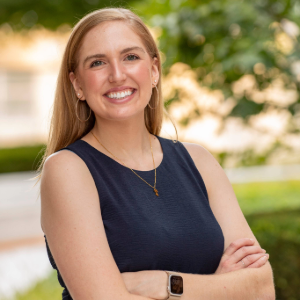
August 2025 Newsletter

August 2025 Newsletter

Student Profile
Emily Dinelli is a PhD student in the Health Sciences Integrated PhD Program (HSIP) Program at Feinberg. Dinelli completed her bachelor’s in mechanical engineering at West Texas A&M University and her master’s in prosthetics and orthotics at The University of Texas Southwestern Medical School.
Currently, she works within the Center for Rehabilitation Outcomes Research at Shirley Ryan AbilityLab, where she investigates systemic and clinical changes that could improve quality of life for individuals with limb loss.
Where is your hometown?
My hometown is San Angelo, Texas—a smaller city in West Central Texas.
What sparked your interest in science or medicine?
I have to give credit to my Aunt Marcia for sparking my interest in science. She was a pioneer in science and engineering, herself being one of the only female engineers on many of the projects she worked on throughout her career (including some with NASA!). In high school, she encouraged me to explore engineering, which led me to discover the field of prosthetics and orthotics. I had the opportunity to shadow a prosthetics and orthotics clinic at Texas Scottish Rite Hospital for Children and was captivated by the way medicine, engineering, and art intersect in this field. It was this moment that really solidified my pursuit of a career dedicated to prosthetics and improving the lives of people with limb loss, and that eventually led me to pursue a PhD.
What are your research interests?
My research focuses on the lived experiences of individuals with limb loss. I’m particularly interested in understanding specific challenges that persist after an amputation, identifying barriers to quality healthcare, exploring the systemic and clinical changes that can enhance health equity and quality of life for this population.
What are you currently working on?
My primary research focuses on the role of social factors in shaping health outcomes among Black individuals living with dysvascular lower limb amputations. I am examining how factors like neighborhood accessibility, healthcare barriers, and broader social domains contribute to hospital readmissions and re-amputations. In parallel, I work as a research assistant for the Center for Rehabilitation Outcomes Research (CROR) at the Shirley Ryan AbilityLab, where I contribute to projects on employment for people with physical disabilities and the development of outcome measures.
Please tell us about a defining moment in your education at Feinberg thus far.
A defining moment in my education at Feinberg has been serving as a graduate research assistant for CROR under the mentorship of Dr. Allen Heinemann. Working with Dr. Heinemann has been instrumental in shaping my identity as a health services researcher. His leadership has empowered me to lead quantitative analyses across multiple projects, explore new methodologies, and gain project management skills. More importantly, being a member of CROR has significantly strengthened my confidence as a researcher and I am deeply grateful for this experience. I will undoubtedly carry the insights and skills I’ve gained from Dr. Heinemann’s mentorship and working among CROR throughout my career.
What do you hope to do with your degree?
I am open to different career paths, but as of right now, I’d love to continue in academia at an R1 research institution. Specifically, I’d love to combine my research skills with either teaching or clinical work. Throughout my career, I hope to pursue research efforts that have real-world applications and impact on the prosthetics and orthotics field.